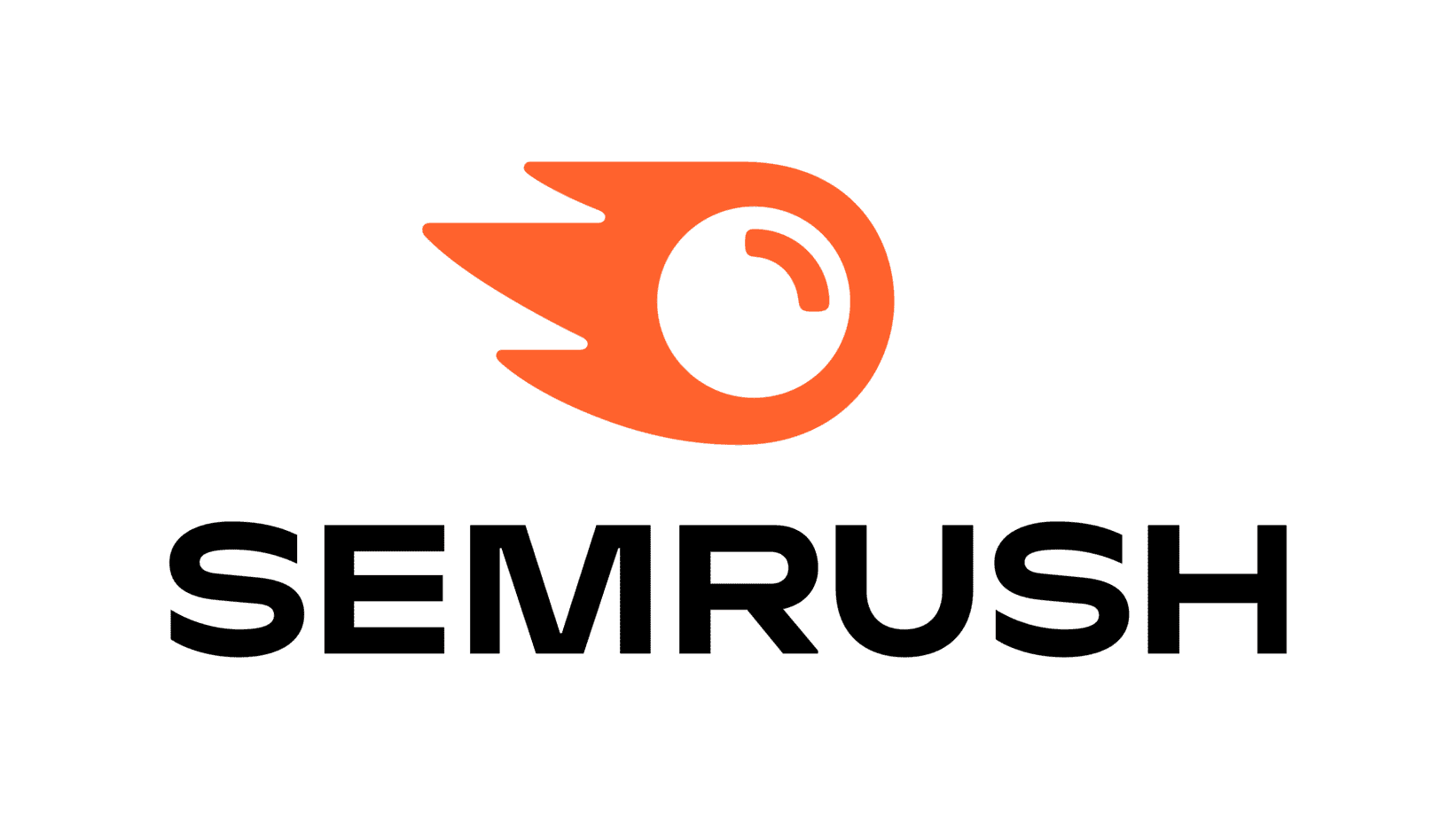Last Updated on July 11, 2025 by Ewen Finser
If you’ve ever fallen down the rabbit hole of SEO tools, you already know the two giants in the space: Ahrefs and Semrush. Both are packed with data, have loyal fanbases, and come with price tags that make you want to pick one and stick with it (though you can totally use both if you have the budget for it).
So how do you decide?
I’ve tested and used both tools in real-world scenarios, from client projects and competitor deep dives to PPC campaigns, content audits, and link outreach. And while both Ahrefs and Semrush have their strengths, this comparison breaks down which tool is worth your money depending on what you actually need.
Let’s start with a quick side-by-side look.
Semrush has generously offered our readers a double extended fully featured FREE TRIAL. Play around with the suite for 2 full weeks to see if it's what you need!
A Quick Comparison: Semrush vs Ahrefs
Here’s how the two platforms compare when it comes to core features:
Feature Category | Semrush | Ahrefs |
Keyword Research | Strong (PPC, intent data, and GSC sync) | Strong (larger global database and long-tail) |
Backlink Analysis | Excellent, includes toxic link audit | Best-in-class depth and freshness |
Site Audits | Powerful, scalable, and alerting | Solid, but more basic |
Rank Tracking | Daily updates and customizable | 5–7 day update delay |
Local SEO Tools | Listing management, reviews, and GMB data | Not supported |
PPC Research | PLA and search ads tools | No PPC data |
Content Tools | SEO Writing Assistant and Topic Research | Limited (Content Explorer only) |
Social Tools | Built-in posting and analytics | None |
Integrations | GA4, GSC, Trello, Google Ads, and more | Screaming Frog, BuzzStream, Link Affinity, and more |
Client Reporting | White-label reports and branding options | CSV/PDF export only |
Free Tools | Website Authority Checker, Keyword Rank Checker, SERP Checker, Keyword Search Volume Checker, Google SERP Simulator, and more | Webmaster Tools, Backlink Checker, Broken Link Checker, Website Authority Checker, and more |
Free Trial | 7-day trial | None |
Starting Price | $60 per month for the Content plan, and $99 per month per domain for the AI plan, and $139.95 per month for the SEO Toolkit | $29 per month for the (very limited) Starter plan and $129 per month for the Lite plan |
Comparing Semrush vs Ahrefs: Feature by Feature
SEO tools can look similar on the surface, but the real differences show up when you dive into features. Let’s break it down, one function at a time.
Keyword Research & Data Accuracy
Which platform gives you the most useful keyword data? It depends on your use case.
The gist: Semrush is best for SEO and PPC, while Ahrefs is ideal for raw organic keyword ideas.
Semrush
Semrush offers a more “big-picture” approach to keyword research. Instead of just surfacing high-volume terms, it maps keywords to intent, SERP behavior, and even paid ad performance. This makes it ideal for building holistic campaigns where SEO and paid campaigns work together.
It also offers tools like Keyword Magic, Keyword Gap, and the Topic Research tool. These are designed to help you find viable opportunities and understand how hard they’ll be to rank for.
Key features:
- Combines organic and PPC keyword data
- Google Ads and PLA (Shopping) keywords
- Keyword intent labeling (informational, navigational, etc.)
- Tracks SERP features, clusters, and historical volume
- Integrates with Google Search Console (GSC)
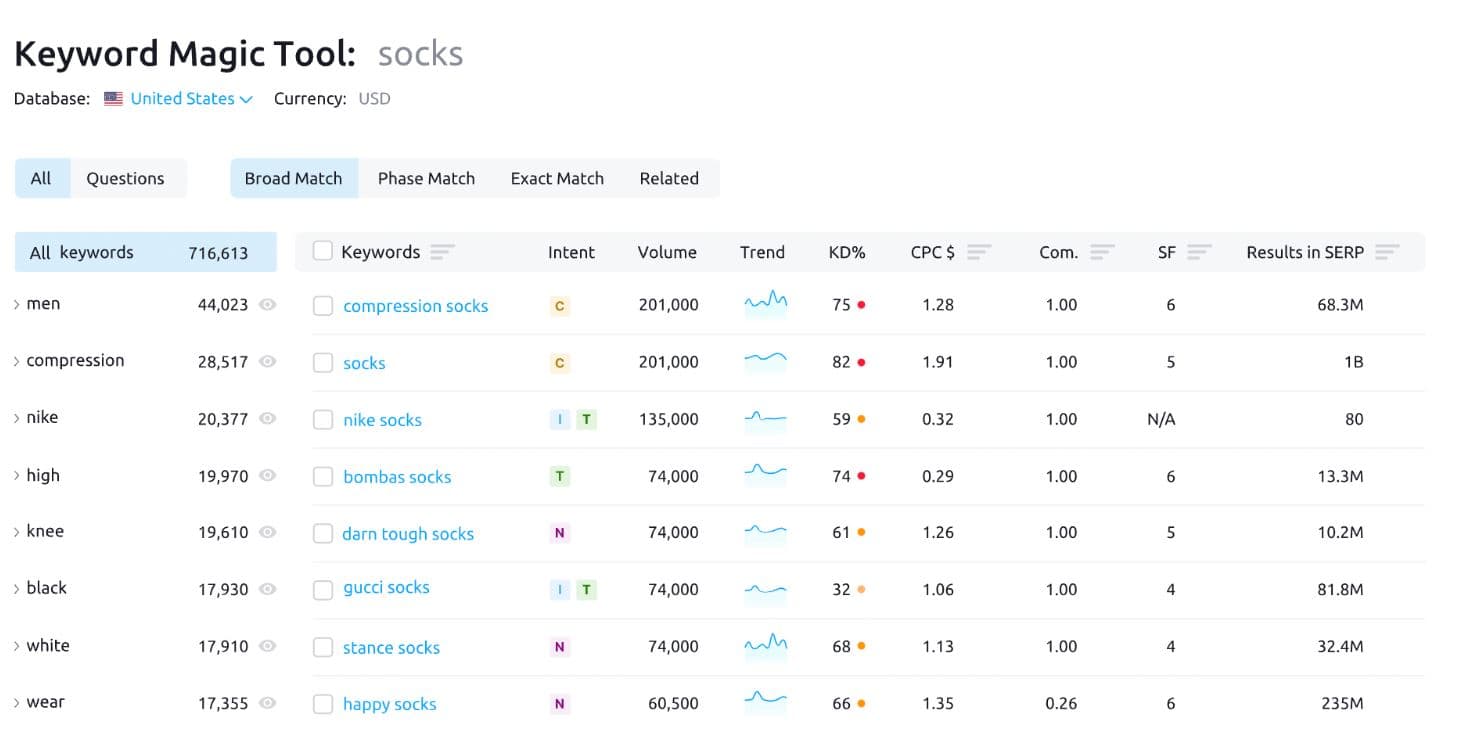
Ahrefs
Ahrefs is laser-focused on organic SEO. If you work in multiple languages or countries, their global data coverage can be a huge plus. And their approach to keyword research, including “click potential,” helps you avoid chasing zero-click keywords that don’t drive traffic.
But there’s no PPC or Shopping keyword data here, and no intent breakdown. So for blended SEO/PPC strategies, it falls short.
Key features:
- Huge international keyword database
- Excellent for long-tail keyword discovery
- Strong keyword difficulty scoring
- Shows clicks-per-search and parent topic
Backlink Analysis
Ahrefs is famous for backlink analysis, but in recent years, Semrush has quietly caught up.
The gist: Ahrefs is best for link builders, while Semrush works great for link audits and cleanup.
Semrush
Semrush’s link tools are more than just a database; they help you act on your backlink profile. If you work with clients or have ever dealt with spammy links, Semrush makes it easy to identify and disavow bad actors.
Key features:
- Accurate backlink database with frequent updates
- Toxic link detection and disavow file generation
- Link building outreach tool with built-in CRM
- Historical link tracking and lost/new link alerts
Ahrefs
Ahrefs is still the go-to if your main concern is building and benchmarking backlinks. The freshness and clarity of the data (plus historical snapshots) make it ideal for outreach planning and competitor analysis.
But it doesn’t offer anything for toxic link cleanup, and that’s a notable gap.
Key features:
- Massive live and historical backlink index
- Excellent new/lost backlink tracking
- Referring domains broken down by DR and anchor text
- Visual link velocity and domain growth charts
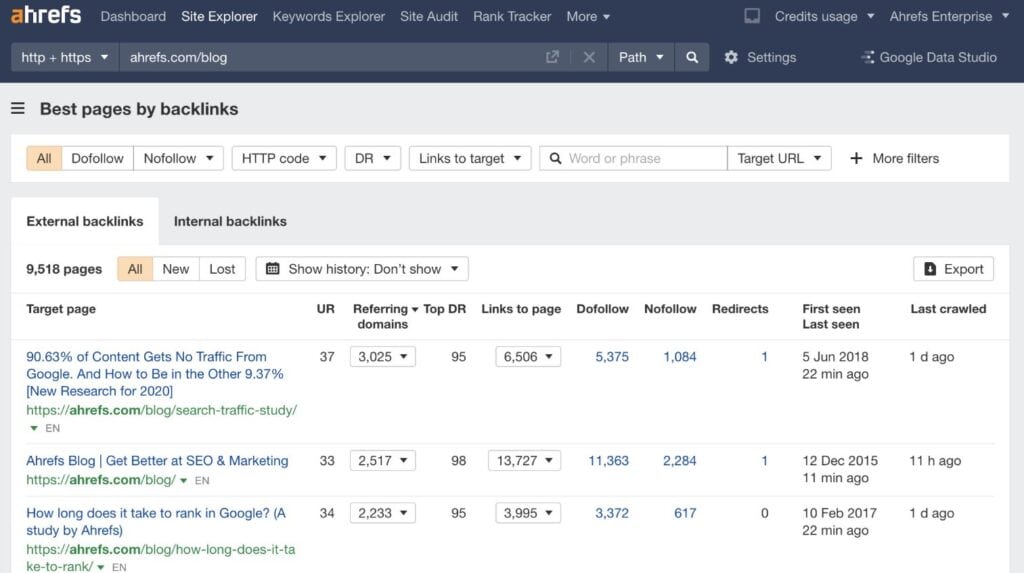
Site Audits & Technical SEO
Both platforms can crawl your site and spit out a list of issues. But one goes deeper and makes it easier to fix what’s broken.
The gist: Semrush is excellent for hands-on SEO, while Ahrefs provides quick insights.
Semrush
Semrush’s Site Audit tool is built for people who actually want to do something with their audit results. It’s especially useful for larger sites, where prioritizing fixes matters. Bonus: you can schedule audits, monitor improvements, and share white-labeled reports with clients.
Key features:
- 140+ on-page and technical checks
- Site Health Score and issue categorization (errors, warnings, and notices)
- Explains each issue and how to fix it
- Crawl comparisons over time
- Core Web Vitals, HTTPS, and structured data checks
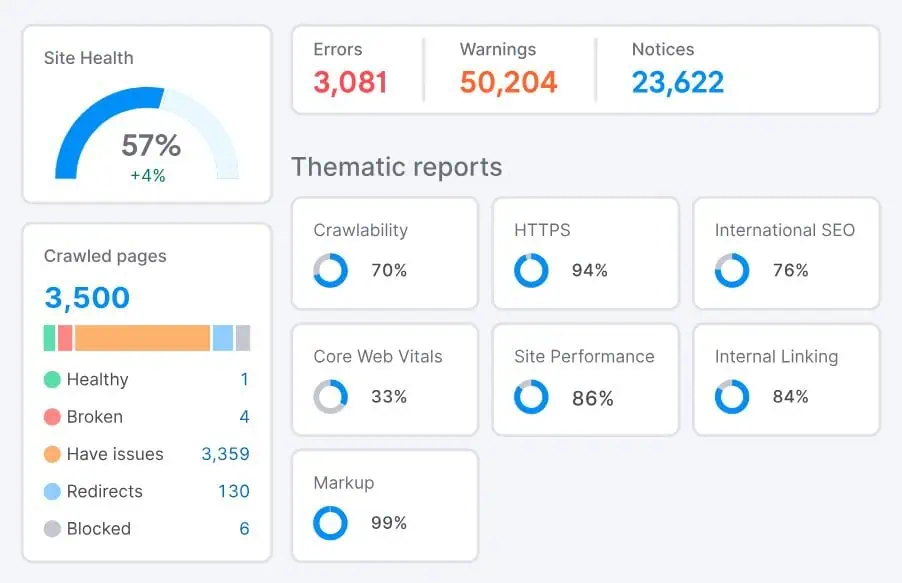
Ahrefs
Ahrefs offers a good overview but lacks some of the workflow features that make Semrush more usable for agencies or teams. There’s no issue fixing guidance or automated monitoring, so if you’re auditing multiple sites regularly, it’s more manual.
Key features:
- Solid technical audits with crawl data
- Highlights issues like 404s, redirects, and slow pages
- JavaScript rendering is supported
- Basic severity scoring
Rank Tracking & Reporting
Who’s ranking where, and how has that changed over time? Both tools can tell you — but at very different speeds.
The gist: Use Semrush if you run an agency and Ahrefs if you prefer casual check-ins.
Semrush
Rank tracking is where Semrush really shines if you work with clients. The visualizations are great, the reports are flexible, and the data is up-to-date every single day. You can even track featured snippets and position volatility.
Key features:
- Daily rank updates (even on lower-tier plans)
- Mobile and desktop tracking
- Local rank tracking
- Tag, group, and compare keywords
- Branded client reports with widgets and charts
Ahrefs
Ahrefs Rank Tracker does the basics and does them well. The update delay alone can make it frustrating if you’re reacting to an algorithm update or trying to show short-term wins.
Key features:
- Ranks updated every 5–7 days, except if you pay extra for daily updates
- Basic charts and filters
- No local rank tracking
- CSV/PDF export only
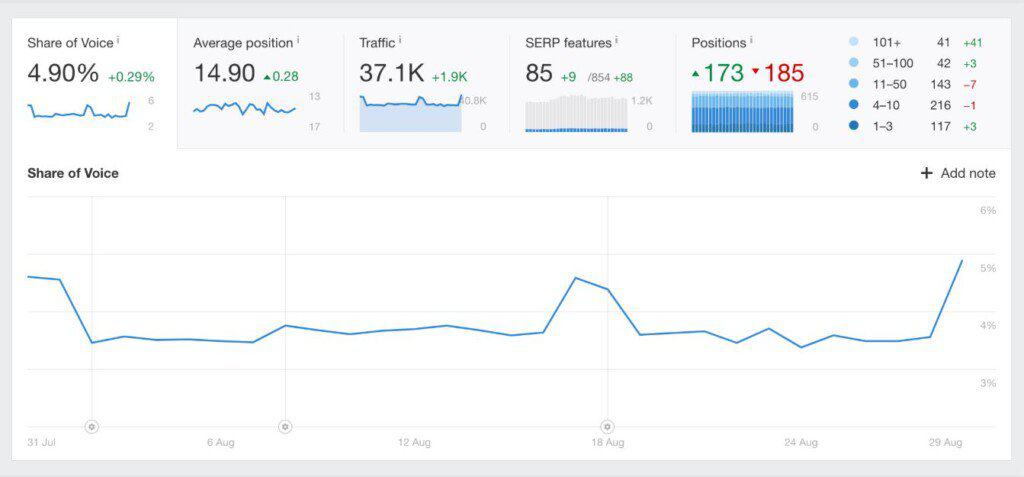
Content & Social Marketing Features
One tool supports your whole content calendar. The other… kind of leaves you on your own.
The gist: Semrush is ideal for content teams, while Ahrefs is better suited for pure SEO discovery.
Semrush
If content is a big part of your strategy, Semrush has your back. You can research topics, optimize your blog, track how it performs, and even post it directly to your socials, all from the same dashboard.
Key features:
- SEO Writing Assistant (real-time optimization while you write)
- Topic Research and keyword clusters
- On-page SEO checker with recommendations
- Content audit tool (integrates with Google Analytics and GSC)
- Social poster and social analytics dashboard
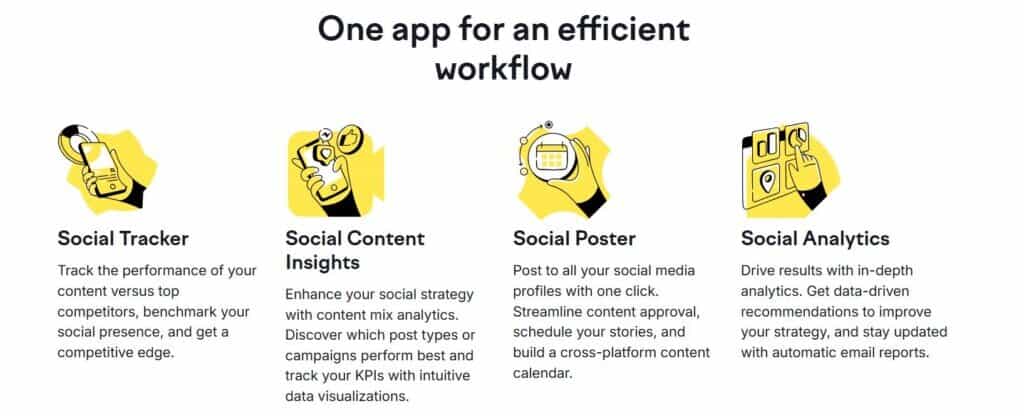
Ahrefs
Ahrefs does a great job helping you find content ideas. But it doesn’t support the rest of the workflow, like writing, optimizing, or distributing it. If you’re a strategist or content marketer, you’ll likely feel that gap.
Key features:
- Content Explorer shows top-performing articles by topic
- Filters by traffic, links, and domain rating
- Great for ideation and inspiration
Local SEO Tools
This is where the gap really opens up.
The gist: Ahrefs isn’t built for local SEO, while Semrush is ideal for local businesses.
Semrush
Semrush’s Local SEO toolkit is perfect for businesses trying to improve visibility in maps, directories, or review platforms. It’s also one of the few SEO platforms that lets you see local search rankings in context.
Key features:
- Local Pack rankings and heatmaps
- Business listing management tool (Yext-powered)
- Reviews monitoring
- Google My Business (GMB) optimization support
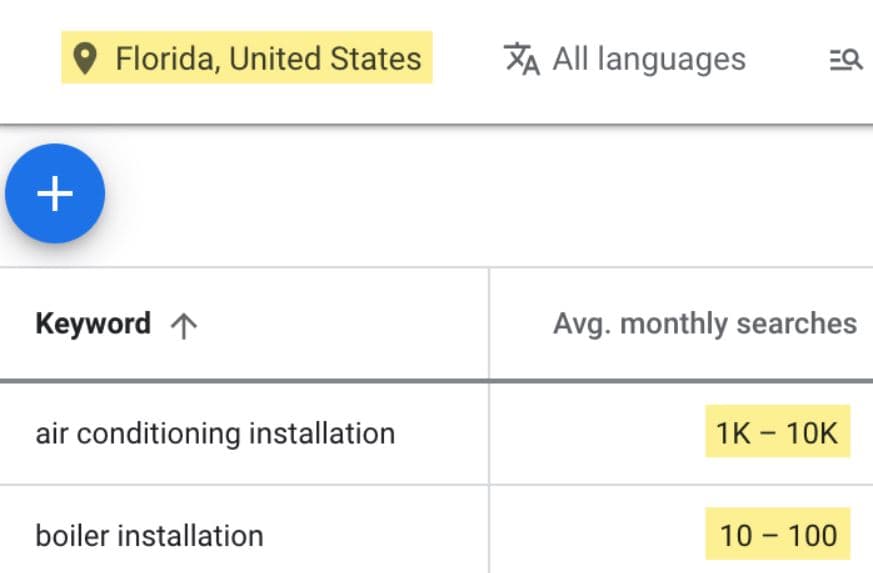
Ahrefs
If you’re an agency that serves brick-and-mortar clients, or your own business relies on foot traffic, the lack of SEO tools might be a dealbreaker.
Key features:
- No local-specific tools
- Limited ability to track local SERPs
Integrations & Ease of Use
Both platforms are fairly intuitive, but one offers more plug-and-play integrations while the other one leans on API access and third-party tools.
The gist: Semrush is best if you want flexible, built-in integrations, while Ahrefs are ideal for API power users.
Semrush
Semrush is clearly designed for cross-functional marketing teams. It connects seamlessly with the platforms you’re already using, which cuts down on tool-switching and manual work.
Key features:
- Integrates with Google Analytics, GSC, and Google Ads
- Connects to Trello, Monday, and other task managers
- Zapier integrations for custom workflows
- Custom dashboards and reporting widgets
Ahrefs
Ahrefs keeps things streamlined with a fast, clean interface and minimal learning curve. While it doesn’t have many native integrations, it supports key third-party tools like Screaming Frog, URL Profiler, and SEOJet.
Enterprise users can also tap into the Ahrefs APIv3 to build custom workflows and dashboards. It’s not quite as plug-and-play, but if you’ve got a tech-savvy team, you’ll have options.
Key features:
- Works with Screaming Frog, BuzzStream, Google Sheets, and more
- APIv3 access for custom automations (Enterprise plan only)
- Connects with reporting tools like AgencyAnalytics and Databox
- Clean UI with fast performance and simple navigation
Pricing & Value
If you’re comparing tools at this level, price isn’t everything, but it matters. Here’s how Semrush and Ahrefs stack up on pricing and what you actually get for the money.
The gist: Semrush is the best value for marketing teams and agencies, while Ahrefs is ideal if you only need SEO data.
Semrush
Semrush isn’t the cheapest tool, but it delivers full value across SEO, PPC, content, social, and reporting, so you’re effectively replacing 3–4 other tools.
You have to subscribe according to toolkit:
- SEO plans start at $139.95 per month (for Pro)
- Traffic & Market plans start at $289 per month (for Pro)
- Local plans start at $30 per month (for Base)
- Content plans start at $60 per month (for Base)
- AI plans start at $99 per month per domain (for Base)
- Social plans start at $20 per month (for Base)
- Advertising plans start at $99 per month (for Base)
Optional add-ons for each toolkit include additional users, lead generation, and base or pro report. The prices of these depend on the toolkit you subscribe to.
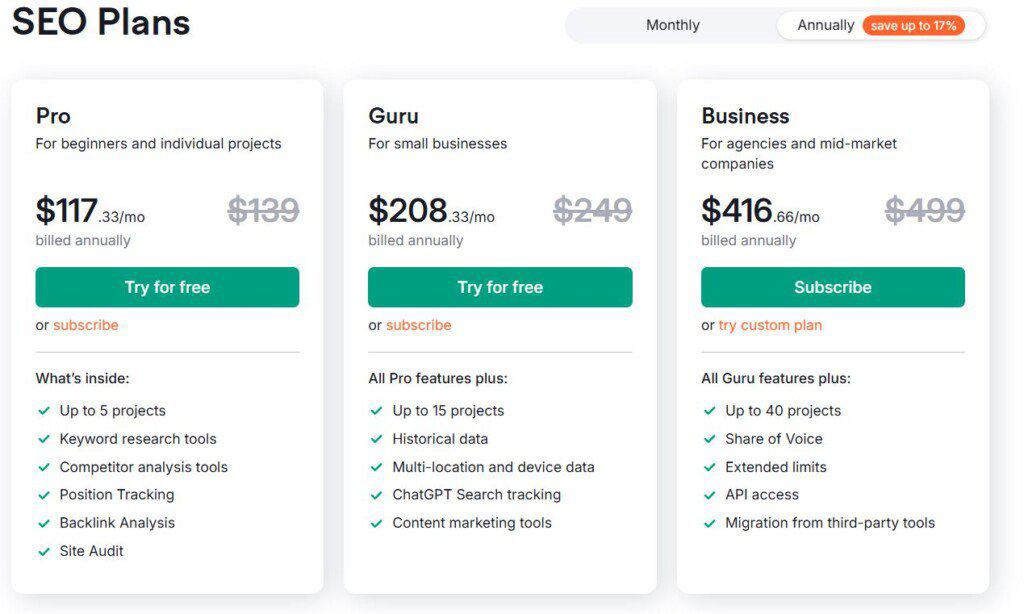
Semrush has generously offered our readers a double extended fully featured FREE TRIAL. Play around with the suite for 2 full weeks to see if it's what you need!
Ahrefs
Ahrefs keeps things simpler: strong data, one tool, one focus, and it’s all about SEO. You’ll get access to backlink analysis, keyword research, and content discovery. But there’s no trial, and advanced users may quickly hit limits on things like tracked keywords or projects.
The pricing works on a more traditional tiered subscription model:
- Starter: $29 per month
- Lite: $129 per month
- Standard: $249 per month
- Advanced: $449 per month
- Enterprise: $1,499 per month
Most plans include one user, and you’ll pay extra if more team members need to use Ahrefs.
Like Semrush, there are optional add-ons, but these are at fixed prices and you can add them onto any tier plan:
- Brand Radar AI: $99 per month per index
- Content Kit: from $99 per month
- Report Builder: $99 per month
- Project Boost Pro: $20 per month per project
- Project Boost Max: $200 per month per project
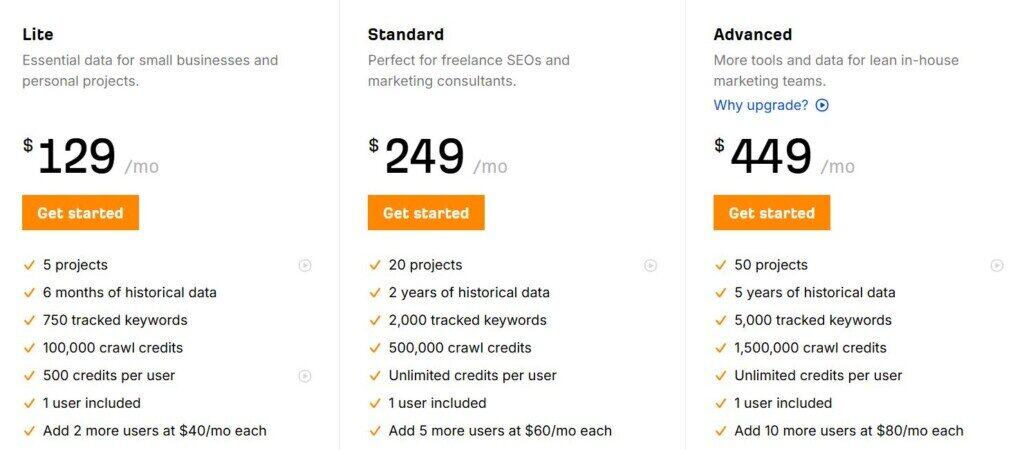
Should You Choose Semrush or Ahrefs? (Use Cases)
Here’s a cheat sheet:
- Solo SEO Specialist or Blogger → Semrush
If you’re running your entire site solo, from keyword research to content creation to basic reporting, Semrush gives you more tools in one place.
- Content Marketing or SEO Agency → Semrush
Semrush is strong for client reporting, rank tracking, audit tools, and content support, making this the obvious winner for teams.
- Local SEO Consultant → Semrush
The only one with tools built for GMB, citations, and local packs.
- PPC + SEO Hybrid Marketer → Semrush
The only one with PLA, search ads, and cross-channel research.
- Link Building Specialist → Ahrefs
Ahrefs is still the king of link databases and discovery.
My Final Verdict: Is Semrush or Ahrefs the Best?
I use a LOT of tools. Probably more than I need to. There are a few that are truly indispensable. I have a Semrush tab open EVERY day as I work. Keyword searches, technical audits, competitor analysis? It does it all. Try it out for free.
If you’re looking for a full marketing suite that supports SEO, PPC, content, social, and client reporting, Semrush is the clear winner. It’s more expensive (since you pay per toolkit), but you get what you pay for.
Ahrefs, meanwhile, still leads in raw backlink data and excels at no-fuss organic SEO research. If that’s all you need, it’s a strong standalone pick.
But for most teams, agencies, and marketers juggling multiple channels and deliverables, Semrush offers the best all-in-one solution and much better value when you consider everything it replaces.
Here are some other related articles you may be interested in:
- Best SEMrush Alternatives [Full SEMrush Comparison vs Competitors]
- Best Ahrefs Alternatives Guide
- Long Tail Pro vs SEMrush
- SEMrush vs Moz
- SEMrush vs Majestic
- Raven Tools vs SEMrush
- SEMrush vs SEOprofiler
- SEMrush vs Serpstat
- SEMrush vs SE Ranking
- SEMrush vs SpyFu
- SEMrush vs SEO Powersuite
- Best Rank Tracker Tools (SERP Checkers)
- Ahrefs vs SpyFu: Which is the Better SEO Tool?


